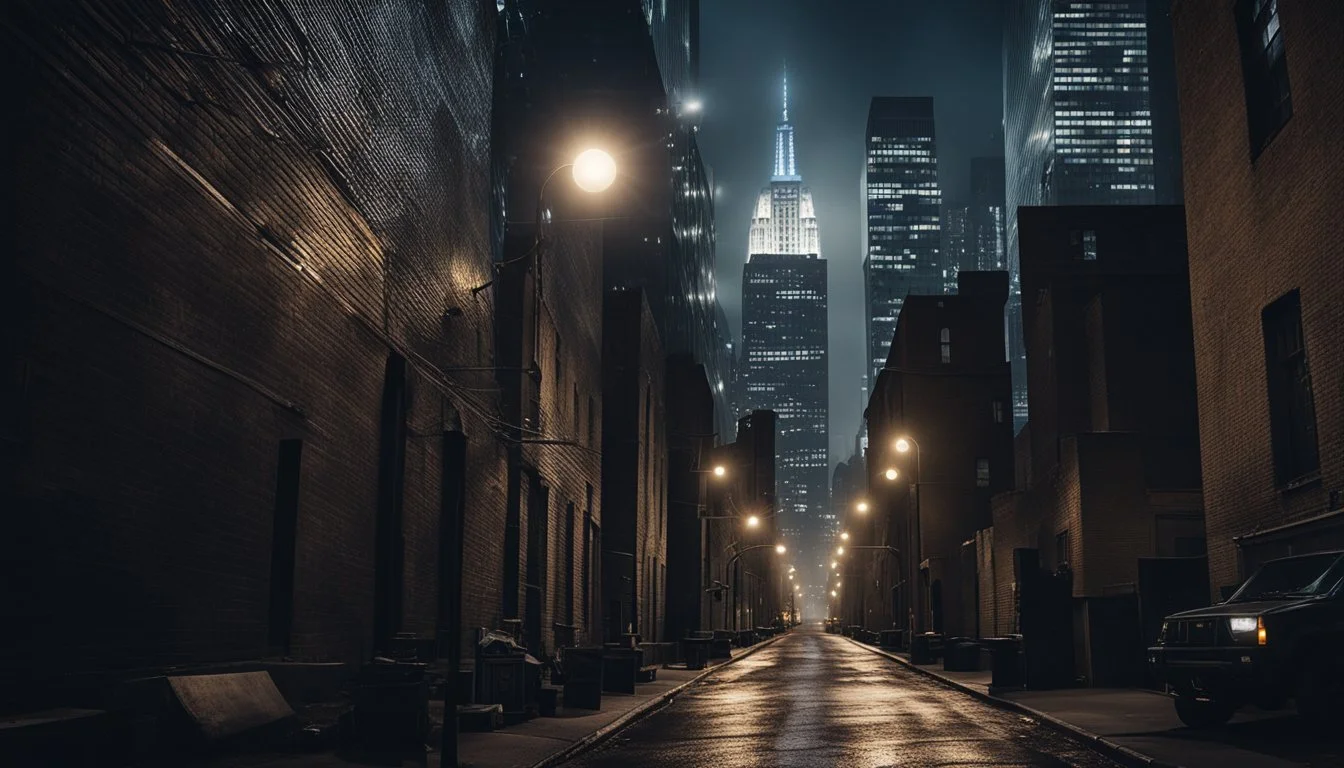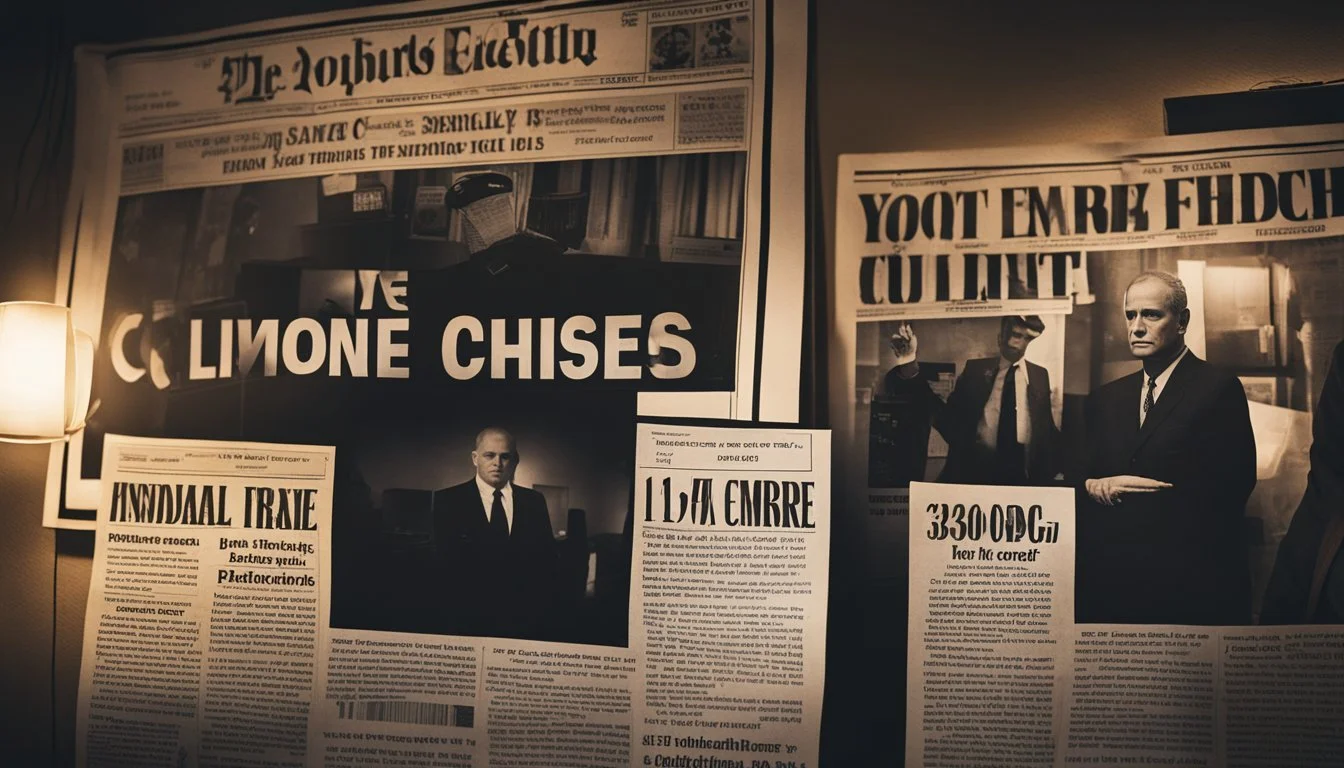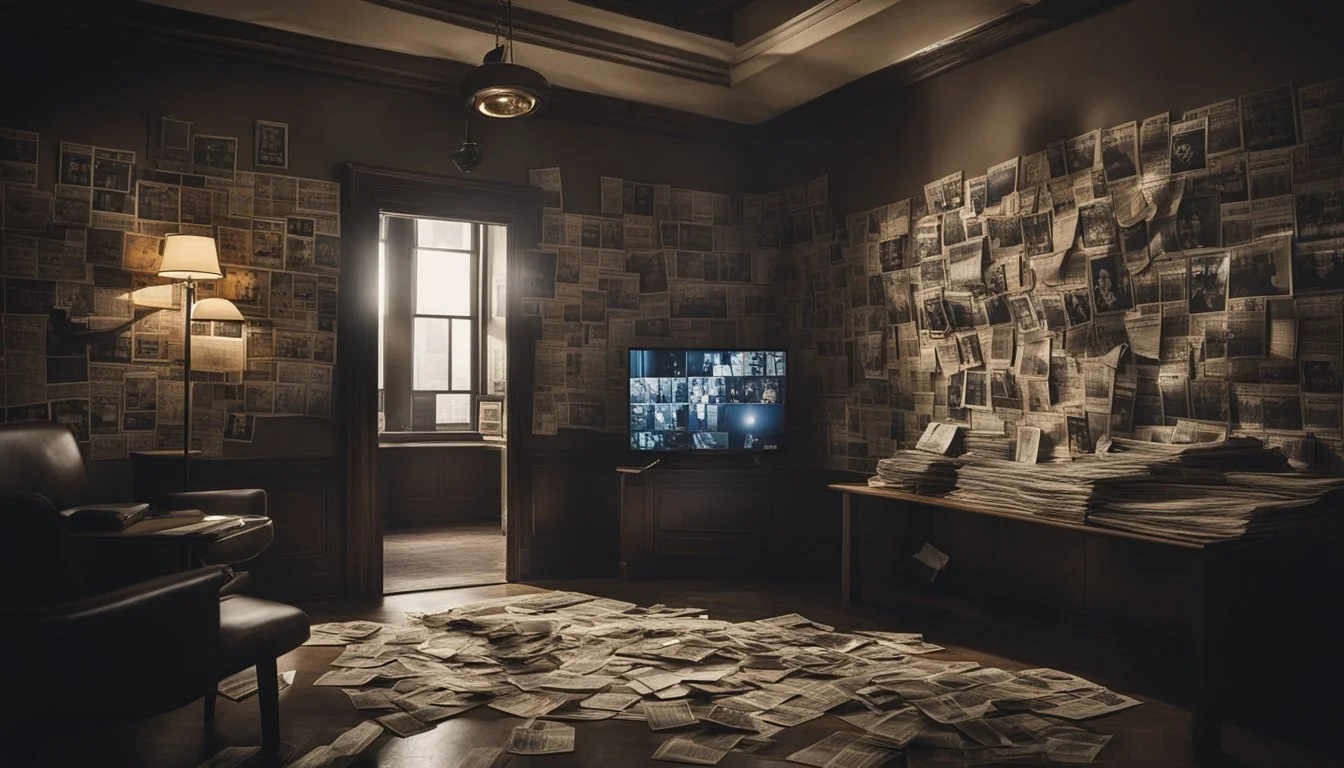10 Best True Crime Documentaries About New York
Must-Watch Stories
True crime documentaries offer a gripping and often chilling glimpse into some of the most notorious criminal cases. With New York City serving as the backdrop for many of these tales, the stories take on an added layer of intrigue and complexity due to the city's unique and dynamic nature. From high-profile mafia kingpins to unsolved mysteries, these documentaries shed light on the darker side of the city that never sleeps.
What makes these documentaries particularly fascinating is their ability to capture the true essence of New York's criminal underbelly. Each documentary weaves together interviews, archival footage, and expert commentary to uncover the truth behind the headlines. This article will guide you through some of the most compelling true crime documentaries centered around New York, revealing the stories that captivated the public and challenged the justice system.
1) The Central Park Five (2012)
The Central Park Five directed by Ken Burns, Sarah Burns, and David McMahon focuses on the infamous 1989 case involving five black and Latino teenagers wrongfully convicted of raping a white female jogger in New York City's Central Park. The case highlights serious issues within the criminal justice system, including coerced confessions and racial biases.
The film features interviews with the five men—Antron McCray, Kevin Richardson, Yusef Salaam, Raymond Santana, and Korey Wise—who were convicted and later exonerated after spending between six and thirteen years in prison. These personal accounts provide a harrowing look into their wrongful convictions and the trauma they endured.
The documentary explores how the media and public perception were influenced by racial stereotypes, painting the teens as guilty before the trial even began. It sheds light on the systemic failures that led to the miscarriage of justice, emphasizing the need for criminal justice reform.
For more information, visit IMDb.
2) Cropsey (2009)
"Cropsey" begins with an exploration of a New York urban legend. The story transitions into a real-life investigation of Andre Rand, a convicted child kidnapper operating in Staten Island during the 1970s and 1980s.
The film, directed by Joshua Zeman and Barbara Brancaccio, merges myth and reality. It examines how urban legends can intertwine with actual crimes, creating fear and intrigue.
Rand's alleged involvement in the disappearances of several children is at the heart of the documentary. The unsettling atmosphere and compelling interviews make "Cropsey" a haunting watch.
For more details about the film, visit Wikipedia.
3) The Jinx: The Life and Deaths of Robert Durst (2015)
"The Jinx: The Life and Deaths of Robert Durst" is an American true crime documentary series directed by Andrew Jarecki. The series, which debuted on HBO on February 8, 2015, is centered on Robert Durst, a New York real estate heir.
The docuseries explores the alleged crimes committed by Durst, including the mysterious disappearance of his first wife, the murder of a close friend, and the killing of a neighbor. It provides an in-depth look into Durst's complex life and the legal battles he faced.
One notable aspect of "The Jinx" is its real-time reactions from Durst himself, especially during the moments where he appears to incriminate himself. The series combines interviews, reenactments, and real footage to create a compelling narrative.
Director Andrew Jarecki previously helmed "All Good Things" (2010), a fictional film also inspired by Durst's life. This background provided Jarecki with unique insights into Durst’s story, which he carried into the making of the docuseries.
The series concluded with Durst's arrest, which was partly influenced by evidence unearthed during the production.
For more details, visit The Jinx on IMDb.
4) NY77: The Coolest Year in Hell (2007)
NY77: The Coolest Year in Hell stands out as a gripping documentary that captures the chaotic essence of New York City in 1977. Directed by Henry Corra and originally aired on VH1, this film dives deep into a year marked by economic decline, rampant crime, and social turmoil.
The documentary explores the infamous Son of Sam killings that sent shockwaves through the community. It also examines the notorious blackout that resulted in widespread looting and arson, painting a vivid picture of the unrest that gripped the city.
Interviews with prominent figures like Afrika Bambaataa and journalists provide firsthand accounts of the period. The film offers a blend of personal anecdotes and factual reporting, adding depth to its portrayal of New York City's struggles and resilience.
NY77: The Coolest Year in Hell does an excellent job of balancing historical context with engaging storytelling. It's a must-watch for true crime enthusiasts and those interested in the social history of one of America's most iconic cities.
For more information, visit IMDb's page on NY77: The Coolest Year in Hell.
5) The Witness (2015)
"The Witness" is a compelling documentary directed by James D. Solomon. The film follows William "Bill" Genovese as he re-investigates the infamous 1964 murder of his sister, Kitty Genovese, in Kew Gardens, Queens.
Kitty Genovese's murder became a symbol of urban apathy when reports suggested that 38 witnesses did nothing to help her. "The Witness" aims to uncover the truth behind these claims.
Bill Genovese, who is also the film's executive producer and narrator, delves deep into the events of that night. Through interviews and reenactments, the documentary seeks to debunk myths and reveal the reality of what happened.
The film not only chronicles the murder but also explores the impact on the Genovese family. It provides a poignant look at a brother's quest for answers and justice.
For more information, visit "The Witness (2015) on IMDb".
6) Strong Island (2017)
Strong Island is a compelling true-crime documentary directed by Yance Ford. The film centers on the tragic 1992 shooting death of William Ford Jr. in Central Islip, New York. William, a young African-American teacher, was killed by Mark Reilly, a 19-year-old white auto repair shop employee.
The documentary explores themes of race, justice, and family grief. It delves into the investigation and legal proceedings that followed William's death. Despite being filed as a homicide by the Suffolk County Police, the family felt the case was mishandled, with Reilly facing no significant legal consequences.
Ford's brother Yance embarks on a personal quest for answers, creating a narrative that combines emotional depth with a critical examination of systemic biases. The filmmaker's exploration of these themes resonates deeply, making Strong Island a critical and thought-provoking watch.
For more information, visit IMDb or Wikipedia.
7) Mommy Dead and Dearest (2017)
"Mommy Dead and Dearest" is a harrowing true crime documentary directed by Erin Lee Carr. It explores the unsettling relationship between Dee Dee and Gypsy Blanchard. Dee Dee had severe Munchausen syndrome by proxy, making her daughter, Gypsy, believe she was ill.
The documentary provides an in-depth look at Gypsy's manipulation and deception by her own mother. It also delves into Gypsy's involvement in Dee Dee's murder, for which she is serving a 10-year sentence for second-degree murder.
The film brings to light the psychological and emotional abuse Gypsy endured for years. This case challenges perceptions of victimhood, making it a gripping watch for true crime enthusiasts.
For further information, visit its IMDb page.
8) The Seven Five (2014)
The Seven Five is a gripping documentary directed by Tiller Russell. It examines the deep-seated corruption within the 75th precinct of the New York Police Department during the 1980s. The film focuses on Michael Dowd, a notorious former NYPD officer, who became one of the most corrupt police officers in the city's history.
The documentary provides an unflinching look at how Dowd and his partner, Patrick Eugene McKenna, operated undetected for nearly a decade. Their criminal activities included drug trafficking, theft, and protecting drug dealers. This documentary highlights the extent of their lawlessness and the impact it had on the community and the police force.
Through interviews and archival footage, The Seven Five paints a vivid picture of Dowd's rise and fall. It delves into the systemic issues within the police department that allowed such corruption to flourish. The documentary is both shocking and revealing, offering a rare glimpse into the darkest corners of law enforcement.
For more information about The Seven Five, visit Wikipedia.
9) There's Something Wrong with Aunt Diane (2011)
"There's Something Wrong with Aunt Diane" is a gripping HBO documentary directed by Liz Garbus.
It explores the tragic car accident that occurred on July 26, 2009, involving Diane Schuler. Schuler drove the wrong way on the Taconic State Parkway in New York, resulting in a head-on collision that killed eight people, including herself, her daughter, three nieces, and three men in another vehicle.
The documentary raises questions about Schuler's state of mind and her actions leading up to the crash.
Witness accounts and 911 calls are examined to piece together the sequence of events.
It delves into the investigation's findings, revealing that toxicology reports indicated high levels of alcohol and THC in Schuler's system.
The documentary also explores the impact on the families and friends left behind.
It examines the broader implications of the tragedy on public safety and drunk driving awareness.
Liz Garbus presents a thought-provoking narrative that leaves viewers questioning what truly happened that day.
For more information, visit the IMDb page.
10) The Real Life Sopranos
"The Real Life Sopranos" explores the connections between the fictional characters of "The Sopranos" and their real-life counterparts. This documentary, released in 2006, highlights the life of Vincent Palermo, a notorious New Jersey mob boss.
He was the de facto boss of the DeCavalcante crime family. This family heavily inspired the criminal activities depicted in "The Sopranos" TV series.
Tony Soprano, the show's protagonist, shares many similarities with Vincent Palermo. Both operated in New Jersey, running illicit enterprises that included strip clubs and other underground ventures.
The documentary delves into the day-to-day operations and personal lives of these mobsters, reflecting the themes of loyalty and betrayal seen in the series.
Viewers get an inside look at the mafia's influence in New Jersey. The documentary helps to bridge the gap between Hollywood’s dramatization and the grittier, real-world Mafia dynamics.
For more information on "The Real Life Sopranos" and its impact on understanding organized crime in the United States, visit the IMDB page.
Released in 2006.
Evolution of True Crime Documentaries
True crime documentaries have significantly evolved, transitioning from simple storytelling to complex, multi-faceted narratives. The journey spans from early documentary formats to the modern era where streaming services flourish.
Early Beginnings
Early true crime documentaries laid the foundation for the genre. Films like "The Thin Blue Line" (1988) by Errol Morris provided a meticulous examination of criminal cases, often questioning the justice system itself.
Traditional documentary styles focused on presenting factual recounts, interviews, and archival footage. This period introduced the blend of investigative journalism and film, setting a precedent for deeper, more analytical storytelling that questioned societal structures and legal processes.
Rise in Popularity
The 1990s and early 2000s saw a surge in interest towards true crime, thanks in part to widespread media coverage and sensational cases. Productions during this era became more polished, with notable examples including the highly acclaimed "The Staircase" (2004), which meticulously followed a real-life court case over several years.
Television series and special programs also began to pepper airwaves, making true crime content a mainstay in pop culture. The increasing visibility of these stories fueled public fascination, leading to a richer and more diverse range of topics being explored in true crime media.
Impact of Streaming Services
The advent of streaming services such as Netflix dramatically transformed the landscape of true crime documentaries. With unprecedented access to vast libraries of content, viewers experienced a new wave of true crime phenomena, like "Making a Murderer" (2015) and "Tiger King: Murder, Mayhem and Madness" (2020).
Streaming platforms enabled binge-watching, shifting how stories were consumed. This format allowed for more detailed exploration of cases, character development, and even viewer-driven investigations. The accessibility and range of these services expanded the audience base, embedding true crime into mainstream entertainment.
Streaming services have also democratized content creation, empowering independent filmmakers and broadening the scope and perspective of stories told within the genre.
The Role of New York in True Crime
New York has been a prominent backdrop in many true crime documentaries, thanks to its rich history, infamous cases, and significant cultural influence on crime narratives.
Historical Context
New York's diverse and bustling environment has long been a breeding ground for various types of criminal activity. From the early days of organized crime in the 1920s and 1930s, the city has seen the rise and fall of infamous mobsters. This period marked the beginning of New York's complicated relationship with organized crime, influencing many true crime stories.
During the 1970s and 1980s, New York witnessed a surge in violent crime, partly due to economic decline and social issues. These decades provided a grim backdrop for numerous true crime tales, some of which are still explored in documentaries today.
Famous Cases from New York
New York has been the scene of several high-profile cases that continue to captivate audiences. One notable case is the Son of Sam murders in the 1970s, where David Berkowitz terrorized the city, prompting an intense police manhunt. This case remains a focal point in many true crime documentaries exploring criminal psychology and investigative methods.
Another significant case is the Central Park Five, where five teenagers were wrongfully convicted of assaulting a jogger in Central Park. This case drew widespread media attention and highlighted issues of racial profiling and justice system failures.
Additionally, the infamous murder of Kitty Genovese in 1964, which led to public outcry over the "bystander effect," remains a critical study in human behavior and police response.
Cultural Impact on True Crime Narratives
New York's influence extends beyond specific cases to shape how true crime stories are told. The city's diverse population and unique neighborhoods provide a rich tapestry for storytelling. Documentaries often delve into the social and cultural aspects of crime, offering viewers a broader understanding of the societal impacts.
New York's role in media and entertainment also means that many true crime documentaries have access to a vast array of resources, such as archives, expert interviews, and firsthand accounts. The portrayal of New York in these narratives often adds a layer of authenticity and urgency, making the stories more compelling to audiences.
Through its historical and cultural significance, New York continues to be an essential part of true crime storytelling, offering a backdrop that is both fascinating and complex.
Understanding the Appeal of True Crime
True crime documentaries captivate audiences by delving into psychological intricacies, societal ramifications, and ethical dilemmas. These factors contribute to an enriching experience, engaging viewers on multiple levels.
Psychological Fascination
Humans have an innate curiosity about the darker sides of life, seeking to understand what drives individuals to commit heinous acts. True crime taps into this curiosity, offering a safe way to explore fear and empathy.
Such shows dissect the minds of criminals, providing a look at motives, traumas, and abnormalities. This insight into human behavior acts as a powerful draw, allowing viewers to analyze the complex interplay between environment and psychology.
Societal Impacts
True crime stories often highlight broader societal issues, such as inequality, systemic corruption, and the failures of the criminal justice system. These documentaries can spark important conversations and drive societal change.
By presenting real-world cases, these stories illuminate hidden societal structures and injustices. They offer a lens through which viewers can examine flaws in their own communities, potentially inspiring activism and reforms.
Ethical Considerations
While true crime can be enlightening, it also raises ethical questions about the portrayal of victims and offenders. The balance between storytelling and respect is delicate, as sensationalism can overshadow the human cost of these crimes.
Documentaries must navigate the ethics of featuring real people's lives and suffering. Responsible filmmaking involves minimizing re-traumatization and respecting the dignity and privacy of those affected, ensuring truth doesn't come at the expense of compassion.





